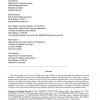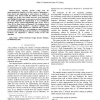123
click to vote
FPL
2010
Springer
15 years 3 days ago
2010
Springer
When utilizing reconfigurable hardware there are many applications that will require more memory than is available in a single hardware block. While FPGAs have tools and mechanisms...
133
click to vote
TVLSI
2002
15 years 1 months ago
2002
Due to its potential to greatly accelerate a wide variety of applications, reconfigurable computing has become a subject of a great deal of research. By mapping the compute-intens...
113
click to vote
TVLSI
2008
15 years 2 months ago
2008
Reconfigurable hardware is ideal for use in Systems-on-a-Chip, as it provides both hardware-level performance and post-fabrication flexibility. However, any one architecture is ra...
128
click to vote
TVLSI
2008
15 years 2 months ago
2008
Abstract--Embedded systems present significant security challenges due to their limited resources and power constraints. This paper focuses on the issues of building secure embedde...
142
click to vote
TODAES
2008
15 years 2 months ago
2008
The extremely high cost of custom ASIC fabrication makes FPGAs an attractive alternative for deployment of custom hardware. Embedded systems based on reconfigurable hardware integ...
130
Voted
MJ
2006
15 years 2 months ago
2006
In this paper, we propose a method for speeding-up Digital Signal Processing applications by partitioning them between the reconfigurable hardware blocks of different granularity ...
158
click to vote
FPGA
2010
ACM
15 years 2 months ago
2010
ACM
We use reconfigurable hardware to construct a high throughput Bayesian computing machine (BCM) capable of evaluating probabilistic networks with arbitrary DAG (directed acyclic gr...
128
click to vote
WCE
2007
15 years 3 months ago
2007
—Linear equations provide useful tools for understanding the behavior of a wide variety of phenomena— from science and engineering to social sciences. A number of techniques ha...
137
click to vote
CATA
2003
15 years 3 months ago
2003
This paper presents a basic framework for applying static task scheduling techniques to arbitrarily-structured task systems whose targeted execution environment is comprised of fi...
129
click to vote
FPL
2008
Springer
15 years 3 months ago
2008
Springer
Association Rules Mining (ARM) algorithms are designed to find sets of frequently occurring items in large databases. ARM applications have found their way into a variety of field...



